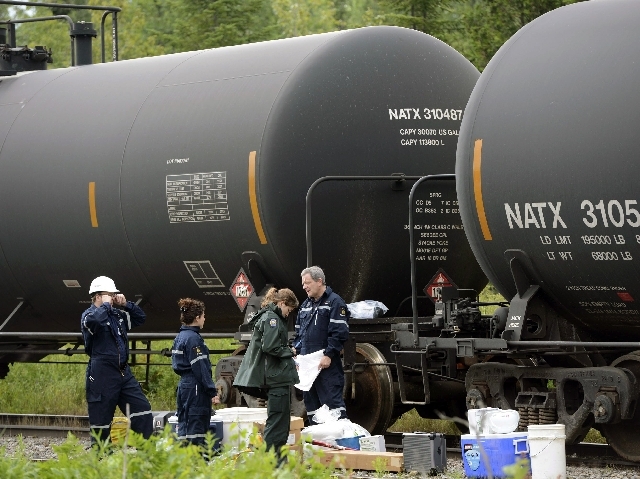Police: 24 bodies now found in Quebec train crash

LAC-MEGANTIC, Quebec — Crews worked Thursday to find the burned remains of the 50 people presumed dead in Saturday’s catastrophic oil train derailment, as Quebec’s premier toured the traumatized town and took the U.S. railway’s chief to task for not visiting sooner.
Police said 24 bodies have now been found. The first to be identified by the coroner’s office was 93-year-old Eliane Parenteau. The intensity of the fire has slowed identification of the dead.
Premier Pauline Marois arrived in Lac-Megantic hours before police said Thursday afternoon they had recovered four more bodies, raising the official body count to 24.
Edward Burkhardt, president and CEO of U.S.-based Rail World Inc., which owns the runaway train, remained in town after arriving Wednesday with a police escort and facing jeers from residents.
Burkhardt has blamed the engineer for failing to set the brakes properly before the unmanned train hurtled down a seven-mile (11-kilometer) incline, derailed and ignited in the center of Lac-Megantic. All but one of its 73 cars was carrying oil, and at least five exploded.
Burkhardt said the engineer had been suspended without pay and was under “police control.”
Quebec’s premier had earlier faulted Burkhardt for what she said was a slow response and called the company’s chief behavior “deplorable” and “unacceptable.” She renewed some of the criticism Thursday.
“The leader of this company should have been there from the beginning,” Marois said at a news conference.
Burkhardt said he had delayed his visit in order to deal with the crisis from his office in Chicago, saying he was better able to communicate from there with insurers and officials in different places.
“I understand the extreme anger,” he said. “We owe an abject apology to the people in this town.”
He was planning to meet with residents and the mayor, but the mayor sharply criticized him Thursday for not doing so.
“There’s (apparently) been a misunderstanding on that issue,” Cathy Aldana, Burkhardt’s assistant and vice president of research and administration at Rail World, said in response. “Our people have been in contact with mayor’s office daily, and I know Mr. Burkhardt wanted to see her personally.”
Investigators also had spoken with Burkhardt during his visit, said a police official, Sgt. Benoit Richard. He did not elaborate.
Burkhardt did not name the engineer, though the company had previously identified the employee as Tom Harding of Quebec. Harding has not spoken publicly since the crash.
“He’s not in jail, but police have talked about prosecuting him,” Burkhardt said. “I understand exactly why the police are considering criminal charges … If that’s the case, let the chips fall where they may.”
Investigators are also looking at a fire on the same train just hours before the disaster. A fire official has said the train’s power was shut down as standard operating procedure, meaning the train’s air brakes would have been disabled. In that case, hand brakes on individual train cars would have been needed.
The derailment is Canada’s worst railway disaster since a train plunged into a Quebec river in 1864, killing 99.
The crash has raised questions about the rapidly growing use of rail to transport oil in North America, especially in the booming North Dakota oil fields and Alberta oil sands far from the sea.
———
THE ASSOCIATED PRESSs David Crary in Lac-Megantic, Charmaine Noronha in Toronto and Tammy Webber in Chicago contributed to this report.